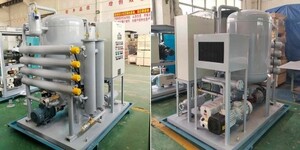Choosing the Right Hydraulic Oil Filtration Machine for Your Needs
Body
In this blog, we'll guide you through the process of choosing the ideal hydraulic oil filtration machine tailored to your specific requirements.
Understanding Hydraulic Oil Filtration:
Hydraulic systems rely on hydraulic oil to transmit power and lubricate moving parts. Over time, hydraulic oil can become contaminated with particles, water, and other impurities, compromising system performance and reliability. Hydraulic oil filtration machines play a vital role in removing contaminants from the oil, maintaining its cleanliness and preserving the integrity of hydraulic components.
Key Factors to Consider:
Filtration Efficiency: When evaluating hydraulic oil filtration machines, consider the filtration efficiency offered by each model. High-efficiency filtration ensures the removal of contaminants down to the micron level, safeguarding hydraulic components from premature wear and minimizing the risk of system failures.
Flow Rate and Capacity: Assess the flow rate and capacity of the filtration machine to ensure compatibility with your hydraulic system's requirements. Opt for a machine capable of handling the volume of hydraulic oil in your system efficiently, without causing excessive downtime or interruptions to operations.
Filtration Method: Hydraulic oil filtration machines utilize various filtration methods, including depth filtration, surface filtration, and magnetic filtration. Evaluate the pros and cons of each filtration method based on your specific application and the types of contaminants present in your hydraulic oil.
Portability and Installation: Consider the portability and ease of installation of the filtration machine, especially if you have multiple hydraulic systems or require mobility for on-site maintenance tasks. Choose a machine that is compact, lightweight, and equipped with features that facilitate convenient setup and operation.
Maintenance Requirements: Assess the maintenance requirements of the filtration machine, including filter replacement intervals, cleaning procedures, and overall upkeep. Opt for a machine that offers ease of maintenance and accessibility to critical components, minimizing downtime associated with servicing.
Quality and Reliability: Invest in a hydraulic oil filtration machine from reputable manufacturers known for producing high-quality, reliable equipment. Prioritize machines constructed from durable materials and equipped with advanced features designed to enhance performance and longevity.
Tailoring to Specific Applications:
Consider the unique requirements and challenges of your specific hydraulic system application when selecting a filtration machine. Whether it's heavy-duty industrial machinery, mobile hydraulic equipment, or precision hydraulic systems, choose a filtration machine that addresses the specific demands of your application, including environmental conditions, operating pressures, and fluid compatibility.
Conclusion:
Choosing the right hydraulic oil filtration machine is crucial for maintaining the performance, reliability, and longevity of hydraulic systems. By considering factors such as filtration efficiency, flow rate, filtration method, portability, maintenance requirements, and application-specific needs, you can make an informed decision and select a filtration machine that meets your requirements effectively. With the right hydraulic oil filtration solution in place, you can ensure the uninterrupted operation of your hydraulic systems and optimize productivity across your organization.















Comments